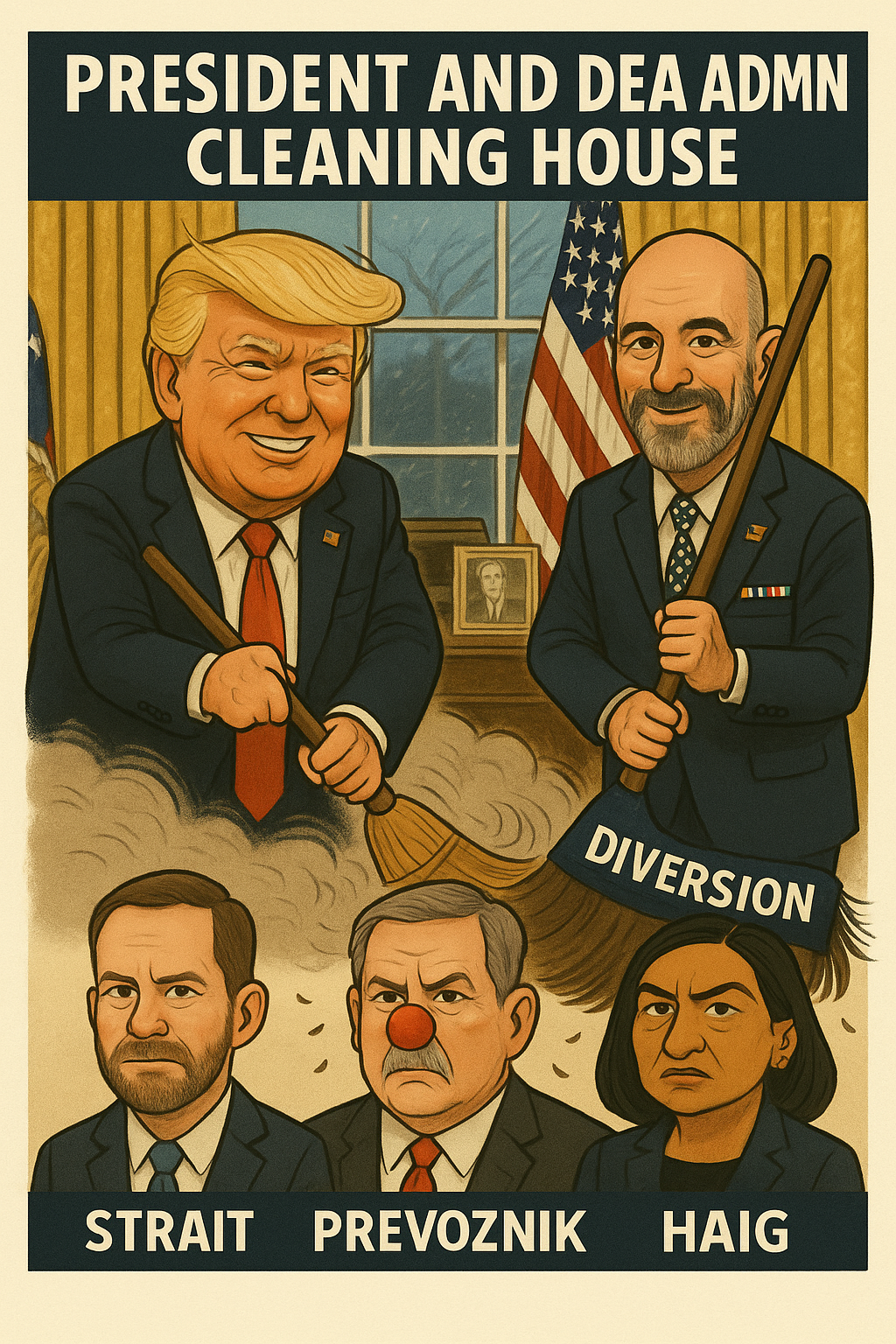Justice Delayed Is Justice Denied
The retirement of Matthew Strait and Thomas Prevoznik is not closure-it is the beginning of a reckoning with the DEA's culture of obstruction.
"Thomas Prevoznik may have pulled the trigger, but Matthew Strait loaded the gun," said Duane Boise, CEO of MMJ International Holdings. "Now the question is whether Administrator Cole will keep allowing Aarathi Haig to pull the strings, or whether he'll finally restore constitutional accountability. Patients' lives depend on it."
The Seven Year Regulatory Ordeal Blocking Medical Innovation
WASHINGTON, DC / ACCESS Newswire / August 28, 2025 / In 2025, while dozens of U.S. states have legalized cannabis in some form, one shocking reality remains: a pharmaceutical company attempting to develop FDA-approved cannabis-based medicines for devastating neurological conditions has spent seven years trapped in a regulatory maze run by the Drug Enforcement Administration (DEA).

MMJ BioPharma Cultivation, which holds FDA Orphan Drug designations and has submitted Investigational New Drug (IND) applications for treatments targeting Huntington's Disease and Multiple Sclerosis, has been forced to fight not science-but a broken, unconstitutional tribunal system inside the DEA. Patients who could benefit from life-changing therapies are left waiting.
DEA Leadership Shake-Up: But One Troubling Holdout
The DEA's Diversion Control Division-long accused of stonewalling cannabis research-is under upheaval. Matthew Strait and Thomas Prevoznik, two senior officials linked to years of obstruction, have retired. Yet the agency's controversial marijuana licensing program continues to operate through an administrative law judge (ALJ) system already invalidated by the Supreme Court.
And at the center of MMJ's stalled case remains DEA attorney Aarathi Haig, who continues to prosecute despite reported failure to maintain good standing with the New Jersey Bar. Her presence underscores a troubling double standard: the DEA demands absolute compliance from registrants while tolerating ethical lapses in its own ranks.
Constitutional Defects in DEA's Tribunal System
Article II Violations - Presidential Oversight Blocked:
DEA ALJs are shielded by multiple layers of tenure protection, insulating them from presidential accountability. In Free Enterprise Fund v. PCAOB (2010) and Seila Law v. CFPB (2020), the Supreme Court struck down similar structures. Even the DOJ conceded in 2025 it would no longer defend these protections, calling ALJs "unaccountable and unconstitutional."Seventh Amendment Violations - Jury Trial Denied:
In SEC v. Jarkesy (2024), the Court ruled that administrative penalties require a jury trial. MMJ argues DEA's tribunals impose "life-or-death" operational penalties on companies and therefore violate the Seventh Amendment.Immediate Harm - Axon v. FTC (2023):
The Court held that being forced into an unconstitutional tribunal is itself an injury. MMJ argues it should not have to endure DEA's flawed process before seeking relief in federal court.
Regulatory Sabotage and Catch-22 Tactics
Beyond constitutional flaws, MMJ has faced a bureaucratic gauntlet of bad faith demands:
DEA insisted on a "bona fide supply agreement" with a DEA-registered researcher-an impossibility, since no researchers could exist without DEA first granting registrations.
DEA rejected MMJ's agreement with Catalent Pharma despite the company following the agency's own template.
Investigators nitpicked vault designs, forcing MMJ to spend $125,000 on construction upgrades to guard against far-fetched risks like underground burglars.
The company pays $20,000 a month in rent for a facility it cannot use.
NIH funding opportunities collapsed after a DOJ attorney gave MMJ false assurances about eligibility, costing the company millions in research funding.
Ethical Failures and Misconduct
The DEA's handling of MMJ has been tainted by misconduct:
Unlicensed Prosecutor: DEA attorney Aarathi Haig is reportedly ineligible for a Certificate of Good Standing in New Jersey, due to unpaid mandatory fees, lapsed CLE compliance, and IOLTA trust account violations. Federal law (28 U.S.C. § 530B) requires government attorneys to follow state bar rules-yet Haig remains on MMJ's case.
Procedural Bias: DEA's ALJ granted deadline extensions to the government but denied MMJ the same.
The Human Cost
This obstruction is not abstract. It has delayed clinical trials for patients with Huntington's and Multiple Sclerosis-two of the cruelest neurological diseases, robbing patients of mobility, cognition, and independence.
MMJ's medicines are not dispensary products-they are standardized, pharmaceutical-grade soft-gel capsules designed under FDA oversight. The DEA's obstruction denies patients hope, while wasting millions in private investment intended to advance healthcare.
A Pattern of Agency Overreach
The DEA's actions fit a broader pattern of unconstitutional abuse. In July 2025, the Third Circuit struck down the Department of Labor's in-house court system in Sun Valley Orchards v. DOL, which bankrupted a fourth-generation family farm over paperwork errors. The parallels to MMJ's ordeal are striking:
Petty violations inflated into crushing penalties
Businesses forced into unconstitutional tribunals
Families and patients left devastated
The Path Forward
Immediate Actions:
DEA Administrator Terry Cole should stay proceedings against MMJ and shift the case to federal court.
DEA must publish clear, workable licensing standards.
Congress and the DOJ Inspector General must investigate Diversion Control Division misconduct, particularly the role of Haig, Prevoznik, and Strait.
Structural Reform:
Abolish the DEA's unconstitutional ALJ system.
Transfer cannabis research oversight to the FDA.
Establish independent oversight to ensure transparency and accountability.
Justice Delayed Is Justice Denied
The retirement of Strait and Prevoznik is not closure-it is the beginning of a reckoning with the DEA's culture of obstruction.
"Strait may have pulled the trigger, but Prevoznik loaded the gun," said Duane Boise, CEO of MMJ International Holdings. "Now the question is whether Administrator Cole will keep allowing Aarathi Haig to pull the strings, or whether he'll finally restore constitutional accountability. Patients' lives depend on it."
The battle over MMJ's registration is about more than cannabis. It is about whether federal agencies can run shadow courts in defiance of the Constitution, whether patients will ever see FDA-grade cannabis medicines in their lifetimes, and whether the DEA serves the law-or itself.
Until resolved, one fact is undeniable: patients are paying the highest price for DEA's unconstitutional obstruction.
MMJ is represented by attorney Megan Sheehan.
CONTACT:
Madison Hisey
MHisey@mmjih.com
203-231-8583
SOURCE: MMJ International Holdings
View the original press release on ACCESS Newswire:
https://www.accessnewswire.com/newsroom/en/healthcare-and-pharmaceutical/mmj-marijuana-patients-battles-against-dea-trump-marijuana-decision-i-1065977
